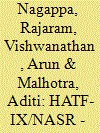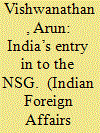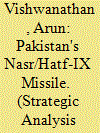| Srl | Item |
| 1 |
ID:
126738


|
|
|
|
|
| Publication |
Bengaluru, National Institute of Advanced Studies, 2013.
|
| Description |
x, 36p.Pbk
|
| Standard Number |
9788187663799
|
|
|
|
|
|
|
|
|
|
|
|
Copies: C:1/I:0,R:0,Q:0
Circulation
| Accession# | Call# | Current Location | Status | Policy | Location |
| 057531 | 355.825119/NAG 057531 | Main | On Shelf | General | |
|
|
|
|
| 2 |
ID:
185656


|
|
|
|
|
| Summary/Abstract |
India has been a long-time supporter of nuclear disarmament. Much before other countries supported these measures, India had proposed universal nuclear disarmament, a nuclear test ban treaty as well as a freeze on the production of fissile material. Opinion is however divided on India’s approach and rationale behind pursuing disarmament. Some call it utopian while others describe it as a pragmatic approach that suited India’s national security needs at that time. India has always had a peculiar relationship with the nuclear non-proliferation regimes. India stressed disarmament as a solution for nuclear proliferation and has viewed nuclear disarmament as enhancing its security interests. This article divides India’s advocacy of global nuclear disarmament into six phases beginning from India’s independence in 1947 to the current period when two parallel tracks have emerged in India’s nuclear diplomacy—one track has continued with its traditional advocacy of universal nuclear disarmament, while the second track where it has engaged with the prevailing non-proliferation regime. India’s nuclear disarmament diplomacy has moved away from moral and ethical considerations to highlighting national security considerations. It is no longer anchored on the ‘disarmament or no disarmament’ question as the traditional disarmament advocacy of India often posed. Instead, the current Indian diplomacy is focused on the emerging rules and frameworks of governance in international security matters and how India can be part of it—multilaterally or through coalition of like-minded partners.
|
|
|
|
|
|
|
|
|
|
|
|
|
|
|
|
| 3 |
ID:
149157


|
|
|
| 4 |
ID:
148755


|
|
|
| 5 |
ID:
133599


|
|
|
|
|
| Publication |
2014.
|
| Summary/Abstract |
On November 5, 2013 Pakistan conducted its fourth test of the Hatf-IX (Nasr) short range battlefield 'nuclear' missile. To date there have been four flight tests of the missile system. After the first three tests (April 19, 2011, May 29, 2012 and February 11, 2013) Pakistan's Inter Services Public Relations (ISPR) had put out identical press releases.1 These statements claimed that the missile had a range of 60 km and carried 'nuclear warheads (sic) of appropriate yield'. The ISPR statement following the fourth flight test of Nasr, a salvo firing of four missiles, was worded differently and did not repeat the claim that Nasr carried a nuclear warhead. Curiously, it referred to the missile's nuclear capability in a roundabout sort of way. The statement claimed that the missile 'contributes to the full spectrum deterrence against threats in view of evolving scenarios'.2
|
|
|
|
|
|
|
|
|
|
|
|
|
|
|
|
| 6 |
ID:
119360


|
|
|
|
|
| Publication |
New Delhi, Pentagon Press, 2013.
|
| Description |
xviii,139p.hbk
|
| Standard Number |
9788182747234
|
|
|
|
|
|
|
|
|
|
|
|
Copies: C:1/I:0,R:0,Q:0
Circulation
| Accession# | Call# | Current Location | Status | Policy | Location |
| 057198 | 955/VIS 057198 | Main | On Shelf | General | |
|
|
|
|